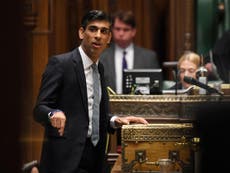The furlough scheme has propped up the massive sham that is our white collar workforce
Why are so many of us still pushing paper, lobbying, project managing for people whose skills we can’t replicate, being paid ludicrous day rates to make PowerPoint presentations?

Your support helps us to tell the story
From reproductive rights to climate change to Big Tech, The Independent is on the ground when the story is developing. Whether it's investigating the financials of Elon Musk's pro-Trump PAC or producing our latest documentary, 'The A Word', which shines a light on the American women fighting for reproductive rights, we know how important it is to parse out the facts from the messaging.
At such a critical moment in US history, we need reporters on the ground. Your donation allows us to keep sending journalists to speak to both sides of the story.
The Independent is trusted by Americans across the entire political spectrum. And unlike many other quality news outlets, we choose not to lock Americans out of our reporting and analysis with paywalls. We believe quality journalism should be available to everyone, paid for by those who can afford it.
Your support makes all the difference.If you were on furlough this year from an office job, or perhaps still are, have you ever wondered why, despite you not being there, your employer is still operating and society is still functioning without you? Why is the world turning and it seems no one misses you or your job?
These thoughts are probably not comforting, but they may be commonplace. Anthropologist David Graeber first laid out his theory of the “Bullshit Job” in a viral essay in 2013, and a book followed five years later. In Bullshit Jobs: The Rise of Pointless Work and What We Can Do About It, Graeber argued that a significant chunk of workers in the UK – 37 per cent – feel they are not in a job that contributes to society.
Graeber sadly died in September but I wonder what he was thinking earlier this year, when millions of us spent weeks or months re-arranging photo albums or learning a new language, while being paid 80 per cent of our salary. Not everyone was twiddling their thumbs, of course. There was a record surge in the number of people wanting to volunteer. Many people were home-schooling their children, cleaning and caring for others, running around like headless chickens. How many people in these situations had a sneaking suspicion that their jobs – the ones they are actually paid to do – weren’t so vital, after all?
This is capitalism gone mad. Seven years after Graeber’s essay was published, why are so many of us still pushing paper, lobbying, project managing for people whose skills we can’t replicate, being paid ludicrous day rates to make PowerPoint presentations? As Graeber explains, most of the country’s wealth is cemented at the very top, therefore many of us work to service those people and that wealth. That is where the money is. That is where the status is. And that is exactly where the protections have been during lockdown.
Almost nine million people were furloughed at the start of the pandemic. Job uncertainty and/or reduced income is not ideal for anyone. But white collar furlough was a dream compared to millions of others in blue collar jobs who had no choice but to work – and then be punished for it (remember when construction workers were the target of blame?). Furlough was comfortable compared to those on the frontlines – teaching, nursing, caring, emptying bins – who are exposed to the virus day in, day out. White collar furlough was and is a privilege, one not afforded to the newly self-employed workers who fell through the gaps and have still not been awarded a penny of government grants, or those who have been made redundant and now have to survive on the pittance that is Universal Credit.
Chancellor Rishi Sunak has been depicted as a superstar for spending more than £30bn on the economy, including the furlough scheme. But who, for the large part, has it benefited? Who will it benefit in the long run? My suspicion is a lot of money has been spent propping up white collar workers in bullshit jobs, while everyone else has to struggle on and possibly die from the virus. Don’t get me wrong – nobody wants to be out of a job. This isn’t easy or pleasant for anyone. But in the near future, when redundancies spike and companies continue to drive “efficiency-oriented cost savings”, it will be those on the very lowest levels who feel the pinch.
Some CEOs did not get a bonus this year; others even took a pay cut. But a report from the High Pay Centre found the moves to be largely short term and superficial. It delivers no real change to the status quo. The phrase, “circling the wagons”, where those at the top protect the riches for themselves, is alive and well, across both the public and private sectors. They are barely distinguishable.
Graeber’s book was published after a near decade of austerity – perhaps that was one reason it was so popular. It seems nonsensical to most of us that NHS managers, for example, receive inflated salaries, while the ones saving lives on the floor of hospital wards are overworked, burnt out, or going to food banks. The government has spent 10 years saying they can’t spend (on us) until the economy is growing, and in the meantime there are shrinking numbers of libraries and walk-in health clinics and community centres, and soaring expensive problems of physical and mental health, of poverty and neglect. We spent a decade ruining any sense of community we had left, just as we entered a pandemic and needed to know our neighbours.
As Graeber says, the motive for austerity has become political rather than economic. Think tanks and politicians and lobbyists espouse the ideology of “free markets” and “privatisation”, yet privatisation has often proved to be a disaster. Just look at the number of post offices that have closed, the chaos of certain train services, the catastrophic results of privatising care homes and NHS trusts. Tory MPs say they don’t want children with free school meals becoming dependent on the state – when the only ones truly dependent on the state are contractors like Serco and G4S. It is a total scam.
As the spending review approaches, I wonder if there will be further bail-outs for the banks and airlines – have we learnt nothing from 2008? – or whether we will focus on free school meals, and frontline workers, and domestic violence refuges, and giving much deserved status and pay to care workers. And to acknowledging that the backbone of this economy is unpaid workers – mostly women, doing the caring and teaching and cleaning and community work – without whom we would be in the gutter.
This summer, we did come close to imagining another version of society, one that included non-radical policies like a universal basic income and free childcare, policies which would contribute towards equality and free us up from relying on our pointless nine to fives. But we need the political will to make it happen. Meanwhile, around a third of us are stagnating in our bullshit jobs, going dead behind the eyes on another Zoom call, and there are millions of us on furlough right now, wondering if our boss will take us back for a £1,000 bonus, despite proving we have been dispensable all this time.
“It’s vital people aren't just returning for the sake of it – they need to be doing decent work,” Sunak said on the bonus policy in July. How does Sunak measure “decent” work? By productive output, or contribution to society? Not quite: it’s as long as you earn £520 on average per month between November and January.
If John Maynard Keynes’s theory that we would all be working a 15-hour week by now had come true, Graeber says the government wouldn’t have liked that. It suits them to keep us busy, arguing over middle management jobs that lead to nowhere and nothing.
I’d go further – if we were less wrapped up in and dependent on our bullshit jobs, this government would have a riot on its hands. They would have to do so many U-turns that it would add up to lasting, progressive change. It is what Graeber would have wanted.







Join our commenting forum
Join thought-provoking conversations, follow other Independent readers and see their replies
Comments